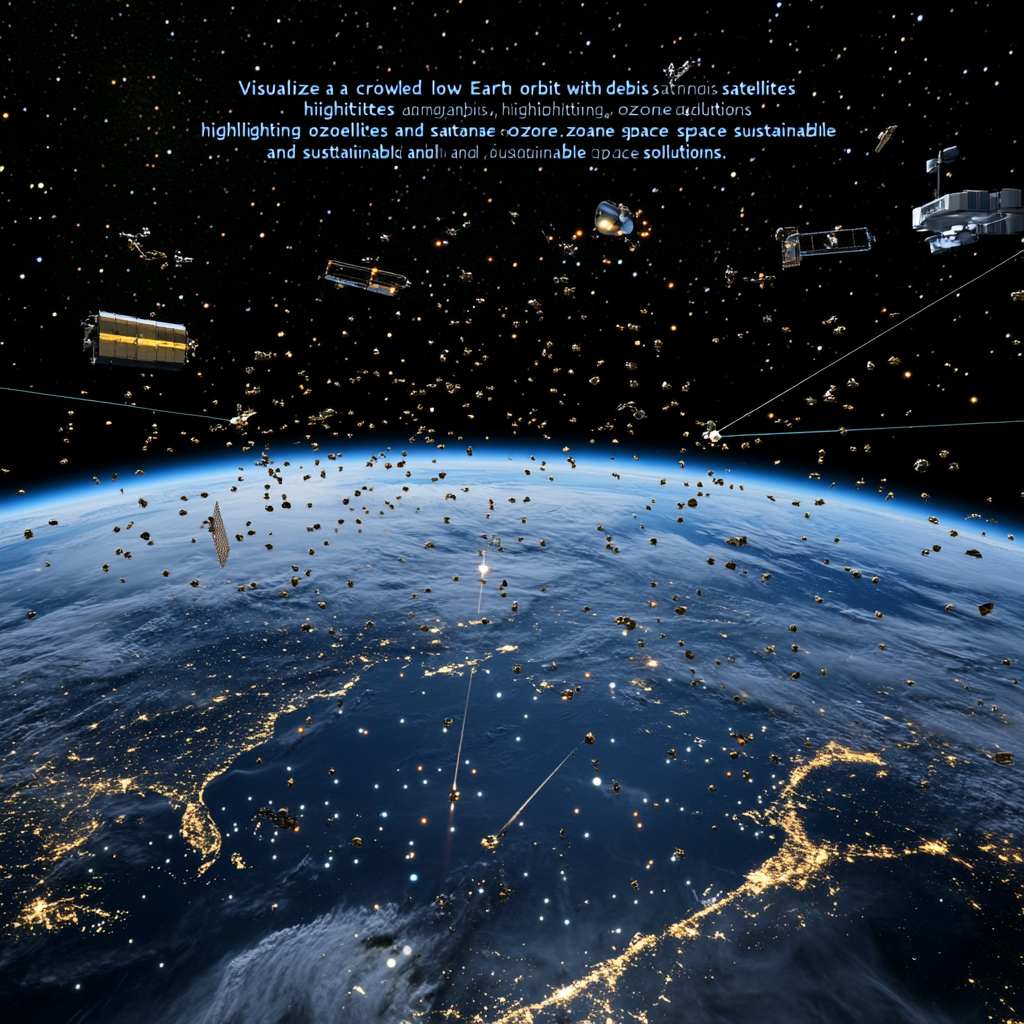
“Space Activity’s Hidden Footprint: An Emerging Eco-Crisis”
The Sky is Not the Limit: Why Rocket Launches and Burning Satellites Pose a Serious Threat to Our Planet
Picture this: the golden age of space exploration is upon us, and rockets are blasting off like fireworks on New Year’s Eve. But as the countdowns become more frequent and the stars twinkle brighter, there lurks an environmental time bomb that’s tick-ticking away above our heads. This isn't science fiction; it’s our modern reality, and it’s urgent! Buckle up, because we’re diving headfirst into the celestial chaos of rocket launches and the dramatic demise of the satellites we’ve sent into the great beyond.
Space Debris: A Galactic Garbage Dump
First off, let’s chat about what’s happening up there. Over the past 15 years, rocket lifts have tripled. Yes, triple the launches means triple the excitement, but hold your applause. In the same breath, we’re looking at a tenfold increase in the number of satellites orbiting our good old Earth. Mega constellations like SpaceX’s Starlink are painting the sky with a dazzling array of communication satellites, aiming to provide global internet coverage. Sounds great, right? Well, there’s a catch – and it’s a big one.
Space debris is skyrocketing, with the amount of unwanted metal and discarded tech lurking in space doubling over the last decade. Just take a moment to digest this: over a million applications for satellite licenses have been filed with the International Telecommunications Union. If we don’t tap the brakes, we’re barreling into an orbital junkyard that even the most robust cleanup crews might find impossible to tackle. It’s like throwing a massive party and then leaving the chaos for someone else to sort out.
Environmental Fallout: More Than Just a Cool Sci-fi Concept
Now, let’s talk about the nitty-gritty, the not-so-sparkly bits that make this situation a downright crisis. You might have heard about global warming, but did you know rocket launches contribute to ozone layer depletion? Let’s break it down.
Modern rockets, with their penchant for burning fossil fuels, spew soot into the atmosphere. This soot isn’t your grandmother’s fireplace ash; it absorbs heat like a champ, nudging temperatures upward in our fragile upper atmosphere. Combine that with aluminum oxides released from those dramatic satellite burn-ups upon reentry, and we’re sitting on a recipe for disaster. The ozone layer, Earth's stylish cap against harmful UV rays, stands to take a nasty hit. Reports suggest that by the end of this century, aluminum oxide concentrations could spike by a jaw-dropping 650% if nothing is done.
Not only that, but the delicate dance of Earth’s thermal balance is disrupted. Turn up the heat in the upper atmosphere, and we’re opening the floodgates to unpredictable global climate patterns. As if that wasn’t enough, the metallic ash from burning satellites has a chance to meddle with our magnetic field, potentially letting cosmic radiation crash Earth’s party uninvited. Just imagine solar flares streaming through the cracks — a proper sci-fi nightmare that could foil us all.
Time's Ticking: Urgent Call to Action
Researchers are waving their red flags, ringing alarms, and generally freaking out about this increasingly dire situation. Munkwan Kim, an associate professor of astronautics at the University of Southampton, is particularly vocal, asserting that if we don’t change our trajectory within five years, we might as well wave goodbye to significant aspects of our planet’s health. The clock is ticking, folks!
Solutions: Can We Steer This Ship Away From Disaster?
So what’s the plan? Is there a way to reverse course on this cosmic catastrophe? Thankfully, it’s not all doom and gloom. There’s hope, and it starts with making some changes to how we approach space travel.
-
Think Green, Rocket Green: We need to develop sustainable propulsion technologies. Rocket launches should embrace clean fuels instead of clinging to fossil fuel combustion. After all, why would we want to launch a rocket into space while simultaneously burning our planet?
-
Space Clean-Up Crew: How do we manage this mounting debris? It’s time for stricter regulations and innovative debris management technologies. Yes, we need guidelines to ensure wasted metal doesn’t linger like that one item on your to-do list that never gets done.
-
Let’s Play Nice Globally: The reality of space travel is that it’s a collective human experience. International cooperation is a must to sketch out standards and responsible practices for space exploration. After all, we’re all sharing this tiny blue dot floating in the vast, dark cosmos.
Wrapping It All Up: Facing the Stars Responsibly
Space exploration is undoubtedly one of humanity's crowning achievements, offering thrilling possibilities and the chance to plummet into the unknown. But as we gaze out into the stars, we must also keep one eye firmly fixed on fixing what’s happening right above our heads. If we don’t conquer the challenges of space debris and environmental degradation, our quest for knowledge could threaten the very ground we stand on.
So, friends, the debates must rage on, and actions need to be taken. It’s about time we treat our atmosphere with the same respect we show our beloved planet — because, frankly, we don’t have a backup.
Want to stay up to date with the latest news on environmental impacts and technological advancements? Subscribe to our Telegram channel: @channel_neirotoken.
